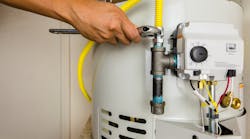Latest from Hydronics
Sponsored
WASHINGTON, DC — On July 21st, the US Department of Energy (DOE) proposed new, Congressionally-mandated energy efficiency standards for residential water heaters. These standards align with recommendations from stakeholders, including two of the largest water heater manufacturers and the Consumer Federation of America. If adopted, they could save consumers $11.4 billion on their energy and water bills every year.
The proposal would require the most common-sized electric water heaters to achieve efficiency gains with heat pump technology and gas-fired instantaneous water heaters to achieve efficiency gains through condensing technology. These standards, which would take effect in 2029 if finalized, are expected to save Americans approximately $198 billion and reduce 501 million metric tons of harmful carbon dioxide emissions cumulatively over 30 years—roughly equivalent to the combined annual emissions of 63 million homes, or approximately 50 percent of homes in the United States.
Improving Outdated Standards
“Today’s actions—together with our industry partners and stakeholders—improve outdated efficiency standards for common household appliances, which is essential to slashing utility bills for American families and cutting harmful carbon emissions,” said US Secretary of Energy Jennifer M. Granholm. “This proposal reinforces the trajectory of consumer savings that forms the key pillar of Bidenomics and builds on the unprecedented actions already taken by this Administration to lower energy costs for working families across the nation.”
Water heating is responsible for roughly 13% of both annual residential energy use and consumer utility costs. DOE last updated residential water heater efficiency standards, which are required by Congress, in 2010. If adopted within DOE’s proposed timeframe, the new rule—which builds on consensus-based recommendations from a wide range of stakeholders—would apply to new water heater models starting in 2029.
Years of Utility Bill Savings
Replacing common-sized traditional electric resistance storage water heaters with electric heat pump water heaters meeting the proposed levels would save consumers $1,868 on average over the life of the appliance, with savings even higher for renters and low-income households who spend a higher percentage of their income on utility bills. President Biden’s Inflation Reduction Act also expands the accessibility and increases affordability of heat pump water heaters through tax credits, rebates, and other incentives, making it easier for families across the nation to switch to a more efficient model when deciding to replace a water heater—and benefit from years of utility bill savings as a result.
Separate standards would raise the minimum efficiency levels for gas-fired storage water heaters, gas-fired instantaneous water heaters, and oil-fired storage water heaters based on technology improvements for those products. Overall, the proposed rule would reduce energy use from residential water heaters by 21%, which translates into $11.4 billion in consumer savings and $2.8 billion in health benefits each year.
18 Product Categories So Far
With this proposal, DOE has now issued proposed or final efficiency standards for 18 product categories so far this year—actions critical to carrying out Congressional direction for energy savings while improving reliability and performance across household appliances and commercial and industrial equipment.
Collectively, DOE’s past and planned energy efficiency actions under the Biden-Harris Administration will save Americans $570 billion and reduce greenhouse gas emissions by more than 2.4 billion metric tons cumulatively over 30 years.
Tankless Pushback
In response to the proposal, Rinnai America Corporation, a leading manufacturer of tankless water heaters, issued as statement saying that, in its current form, the draft rule will unreasonably restrict consumer access to certain tankless water heater products, disproportionately impacting middle-income households and small businesses.
“As currently drafted, DOE’s proposed rule will create an uneven market that effectively bans an already energy efficient product and puts American jobs at risk,” said Frank Windsor, president of Rinnai America. “Consumers who rely on access to tankless water heaters will see their options limited, resulting in higher energy bills and shorter appliance lifespans, while the very environmental goals prompting this rule will go unfulfilled. We urge DOE to re-consider this untenable rule for standards that better protect American consumers and drive our energy efficiency goals forward.”
Rinnai urged members of the public who wish to submit a comment on the draft rule to contact the DOE or their representative in Congress.


